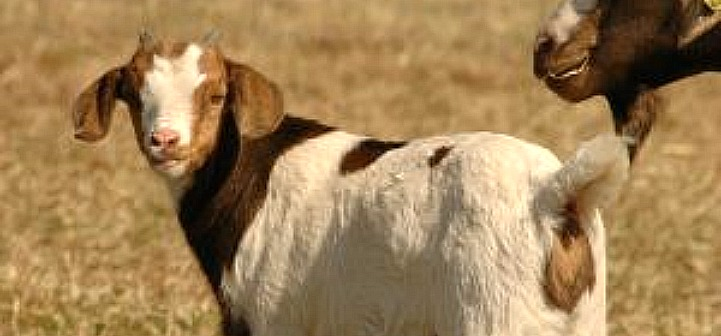Suggested supplemental feeding program
A complete goat mineral containing selenium should be offered free choice year-around in most production situations. When goats are raised on browse, abundant supply should be made available to allow goats to be very selective and to ingest a high quality diet that will meet their nutritional requirements. When forage or browse is limited or of low quality (< 10% protein), does in the last 30 days of gestation, lactating does, and developing/breeding bucks should be fed 1.0 lb./day of a 16% protein mixture (77:20:2.5:0.5 ground corn : soybean meal : goat mineral : limestone). Alternatively, ground corn and soybean meal can be substituted by whole cottonseed for gestating and lactating does. Low to medium quality forage (> 10% protein) will meet requirements of dry does and non-breeding bucks. When forage or browse is limited or of low quality (< 10% protein), weanlings prepared for market, replacement doelings and yearlings should be fed 1.0 lb./day of the 16% protein mixture described above. Weight gains of growing goats supplemented with whole cottonseed on pasture have not been assessed yet to make recommendations. Goats can be forced to eat very low quality feed including twigs, tree bark, etc., but producers should be aware this practice will hurt the productivity of the meat goat herd.
WARNING: Feeding high concentrated diets should be done gradually up to the target daily amount. For example, if the target daily amount is 1 pound, the first day the high concentrate diet is fed, offer only 4 oz per animal, 8oz the third day, 12 oz the fifth day and 16 oz (1 lb) on the seventh day. It is better, to split the daily allowance in two feedings…morning and evening. Also, every goat receiving concentrated diets should have up to date immunization against enterotoxemia (Clostridium perfringens types C and D).
Luginbuhl, J-M. 2006. Pastures for Meat Goats. In: Meat Goat Production Handbook, ed. T.A. Gipson, R.C. Merkel, K. Williams, and T. Sahlu, Langston University, ISBN 1-880667-04-5.
